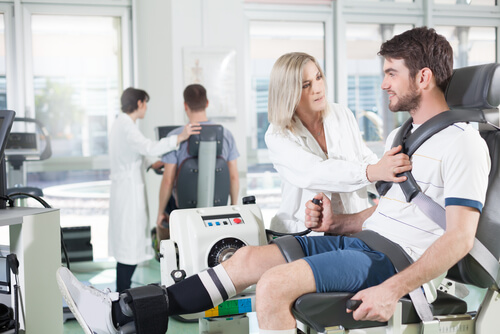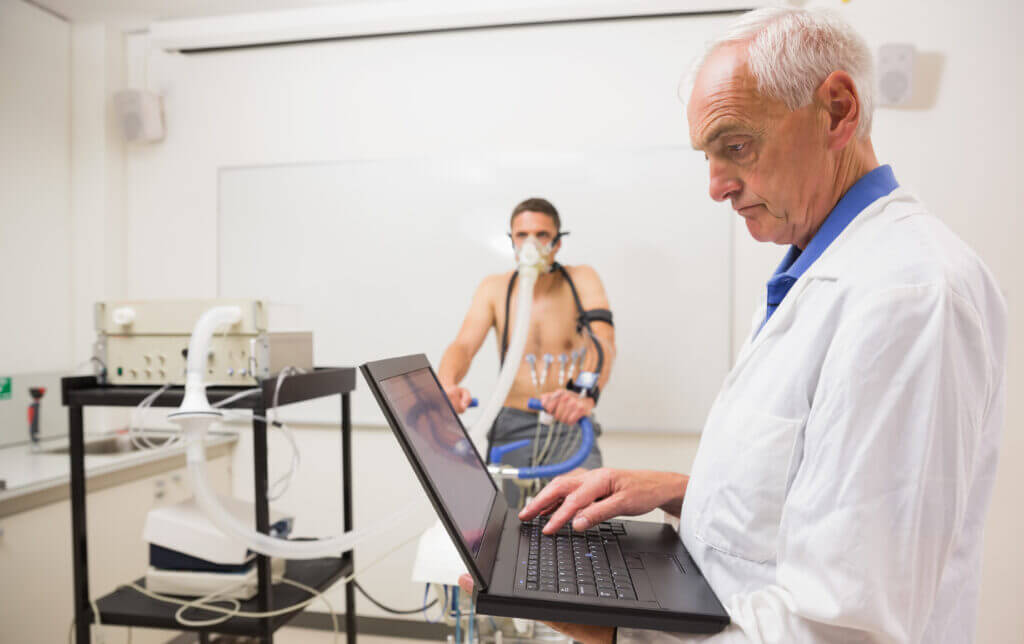Most people know that regular exercise is critical when it comes to your health. However, in some cases, individuals need guidance on how to start or maintain an exercise program. That’s where the field of exercise science comes in. But what is exercise science? What is the definition of exercise science? This is a somewhat broad term covering several different occupations in the health and fitness industry. All of these occupations focus on achieving better health and wellness. Exercise sciences essentially focus on a person’s response to exercise. That is why many people in the field become:
- physical education teachers
- strength trainers
- fitness consultants
It’s possible to pursue an associate’s degree, bachelor’s degree, master’s degree, or even a doctoral degree in the field of exercise science. The field continues to grow.
Related Resource: What is an Exercise Physiologist?
How Does Exercise Science Differ from Similar Fields?
Exercise science is a commonly misunderstood field. Many people confuse it with kinesiology and exercise physiology. But while they all focus on wellness, these three fields have different focuses. They tend to lead to different career paths. Since exercise science is a relatively broad degree, it doesn’t usually involve the same concentration of science courses as kinesiology and physiology degrees do.
Kinesiology examines human movement, function, and performance. In many cases, a kinesiology degree will prepare students for careers in:
- orthopedics
- physical therapy
- occupational therapy
- sports instruction
Kinesiology has a broader focus than exercise science does. While kinesiology studies human movement in both athletics and everyday life, exercise science focuses on movement during exercise.
Exercise physiology, on the other hand, looks more closely at how to analyze and improve health through exercise. In particular, an exercise physiologist examines the impact that exercise has on different body systems. They’re the ones who conduct fitness assessments by measuring oxygen levels, heart rate, and other parameters. Exercise physiology is a narrower field than exercise science. It can sometimes be a specific degree concentration for exercise science majors.
Students with degrees in exercise physiology will often find work as exercise physiologists for:
- sports teams
- gyms
- government agencies
- colleges
Alternatively, they may go on to pursue master’s or doctoral degrees to become physical therapists or occupational therapists.
The field of exercise science involves applying elements of kinesiology and exercise physiology. It involves understanding the human body’s response to exercise. It primarily focuses on the development of exercise plans to improve health and help clients reach their fitness goals. Sometimes, exercise science will also focus on sports nutrition. Many students with degrees in exercise science find work as a(n):
- personal trainer
- fitness consultant
- athletic trainer
- strength coach
- conditioning coach
However, an exercise science degree also offers a strong foundation for pursuing advanced degrees in exercise-related fields.
Related Resource: What are the Benefits of Earning a Degree in Fitness or Exercise Science?
What Classes Will You Take in an Exercise Science Program?
If you’re pursuing an associate’s degree or a bachelor’s degree in exercise science, you likely will take a mixture of theory courses and courses that let you apply that theory. Usually, an exercise science program includes courses in:
- anatomy
- physiology
- chemistry
- physics
These science courses will help you understand how the body changes in response to physical exercise. They also serve as an excellent foundation if you want to later move into a more specialized field.
A good exercise science program will also include strength and conditioning courses, kinesiology courses, and exercise physiology courses. Courses in kinesiology and exercise physiology usually won’t go into the same depth as the courses you’d take for a degree in those fields. However, they do provide a good foundation if you later decide to go into one of these fields.
What Careers Can You Pursue With an Exercise Science Degree?
With an exercise science bachelor’s degree, you can find a range of good jobs. And since people will always work to improve their health beyond the reaches of traditional medicine, most of these fields have great potential for future growth. Here are some of the jobs you might be interested in:
Fitness consultant – If you have an interest in teaching in addition to an exercise science degree, you might enjoy being a fitness consultant. Sometimes, fitness consultants work as personal trainers at gyms. Once you have experience as a trainer, you may also choose to work with individual clients on a freelance basis.
Sometimes, fitness consultants even make money by training people virtually. They might gain a good reputation by posting videos and other informational content about training and overall health. From there, they can offer courses or individualized programs for people looking to improve their fitness. On average, fitness consultants make $24,000 per year, but there’s a wide range in salaries depending on location and experience.
Coach – Especially if you’ve been a competitive athlete at some point, working as a coach can be a worthwhile endeavor. And while not all coaches are required to have a degree, having an exercise science degree will help prepare you for coaching and make you stand out as an applicant. With a degree, you’ll be better equipped to help each athlete on your team develop to reach their full potential. Coach salaries vary widely depending on institution type, sport, and how competitive a given team is. For instance, the average pay for a college head basketball coach is just over $40,000, but some of the head coaches of NCAA basketball teams make millions per year.
Exercise or Sports Physiologist – You don’t need a degree specifically in exercise physiology to be an exercise physiologist. Being an exercise or sports physiologist is somewhat similar to being an athletic trainer, but you’ll pay more attention to biometrics. Exercise physiologists conduct assessments and monitor a patient’s health and vital signs as they follow a specific exercise plan. They frequently work at hospitals and rehabilitation centers, as well as with sports teams. Though this is another field where pay varies considerably, the average is just over $46,000 per year.
Physical Therapy Assistant or Rehabilitation Tech – This is a great career to go into if you’d like to eventually become a physical therapist. With an exercise science degree, you can work alongside a physical therapist or rehabilitation specialist helping ensure that patients follow prescribed exercise routines. Usually, a physical therapist prescribes the exercise routines, and a physical therapy assistant can then work directly with the patient. The national average salary for a physical therapy assistant is just under $60,000.
Spa Manager – This might seem like an unusual career choice for someone with an exercise science degree. But a good bit of exercise science focuses on wellness, and spa managers work to create an environment where clients can feel their best. This career choice is a good idea if you have an interest in hospitality and strong business acumen as well. On average, a spa manager will make about $37,000 per year.
Athletic Trainer – Athletic trainers can diagnose, treat, and help prevent injuries, and they typically work with an institution or an individual sports team. If an athlete is injured on the field, an athletic trainer is usually the first one on the scene. They can stabilize an injury, and depending on the severity, they may be able to help treat it. Athletic trainers also educate athletes on injury prevention, and they sometimes teach classes on athletic training as well. On average, they make just under $48,000 per year.
What Careers Are Available with a Master’s or Doctoral Degree?
After earning a bachelor’s degree in exercise science, you may choose to begin working toward an advanced degree. Some programs offer advanced degrees in exercise science. However, your bachelor’s degree can also prepare you for an advanced degree program in physical therapy, exercise physiology, or occupational therapy. Depending on the path you take, you may be able to work in one of these professions:
Physician Assistant – If you have an interest in the medical field as well as the fitness industry, you may find that you want to be a physician assistant. In this role, you can provide primary care while working closely with doctors. In some cases, you can even prescribe medication. Physician assistants earn over $100,000 per year on average.
Physical therapist – In some ways, physical therapy is a very advanced form of personal training. With a master’s or doctoral degree in physical therapy, you’ll be able to develop personalized exercise plans to help patients correct strength imbalances and heal from injuries. Physical therapists earn just under $90,000 per year on average.
Occupational therapist – Occupational therapy is a little like physical therapy. But these therapists use everyday activities to help patients lead better lives. For example, a recently disabled person may see an occupational therapist to learn and practice ways to navigate their everyday surroundings. Occupational therapists work with a wide range of clients. They can help children and geriatric patients alike. They also work with individuals who have mental and physical health issues. The national average pay for an occupational therapist is just over $92,000. This makes it one of the better-paying jobs on the list.
Chiropractor – Chiropractors can help patients manage spine and nerve issues without drugs or surgery. To be a chiropractor, you usually need a doctoral degree. Having an undergraduate degree in exercise science can help you get some of the foundational knowledge you need to succeed in a chiropractor degree program. The average pay for a chiropractor is about $68,000, but experienced chiropractors often earn much more.
Related Resource: What Does A Sports Nutritionist Do?
What Are Some of the Certifications You Can Pursue?
Depending on the exact career path you’d like to pursue, you may or may not need to pursue a specialized certification. These certifications can show potential employers that you have the knowledge needed to excel on the job. They can help clients see that you’re prepared to help them reach their goals.
Compared to many other fields, exercise science has a very wide range of certifications to choose from. Here are a few prominent ones:
American Council on Exercise (ACE) – This is an organization offering a range of different certifications. If you intend to go into personal training or become a fitness consultant, the ACE personal trainer certification is a reputable one that many gyms look for when hiring. You also can become certified as a medical exercise specialist, a health coach, or a group fitness instructor.
American College of Sports Medicine (ACSM) – This is one of the most respected certifying agencies in the United States. The American College of Sports Medicine offers certification in personal training, and you can also become a certified exercise physiologist or certified group fitness instructor. To become a certified exercise physiologist, you need to have a bachelor’s degree in exercise science, kinesiology, or exercise physiology. The certification is a great way to distinguish yourself in the field.
National Academy of Sports Medicine (NASM) – If you want to be able to provide nutritional programming along with exercise programming, you may be interested in supplementing your exercise science degree with the National Academy of Sports Medicine nutritional coaching certification. This organization also offers certification in personal training and group fitness instruction. It also offers a new specialized certification in indoor cycling instruction.
Aquatic Exercise Association (AEA) – If you want to help people reach their fitness goals, you don’t have to do so in the field or at the gym. With the Aquatic Fitness Professional certification, you can show aquatic centers and individual clients that you’re prepared to train people in a variety of aquatic sports. You don’t have to have a degree for the certification, but since the exam is very rigorous, it’s a good idea to study intensively for it.
National Strength and Conditioning Association (NSCA) – If you want to specialize in strength and conditioning coaching after getting your degree, the NSCA Strength and Conditioning Specialist certification is an excellent credential to pursue. Any exercise science degree will provide some education on strength and conditioning, but the certification will ensure that you have the specialized knowledge needed to work as a strength and conditioning coach. If you’d prefer a broader certification, the NSCA can also certify you as a personal trainer.
The NSCA also offers certification in tactical strength and conditioning. This certification will prepare you to apply your fitness knowledge to the physical training of military personnel, police officers, fire and rescue personnel, and other first responders. And if you want to work with special populations like people with certain health conditions, becoming certified as a Special Population Specialist can prepare you for the job you want.
Athletics and Fitness Association of America (AFAA) – This certifying body is especially geared toward group fitness instructor certifications. You can become certified as a general instructor for group fitness or work toward specialized certifications in sunrise yoga, indoor cycling, Zumba, and more. You also can become certified as a personal trainer or nutrition coach. If you’d like to take more than one exam, the AFAA offers bundle pricing that lets you save on each exam.
Conclusion
If you’re an active person who wants to use your knowledge to make a major positive impact on the lives of others, pursuing a degree in exercise science is a great first step. Now that you know the exercise science definition and can define exercise science, this degree can serve as a stepping stone to a wide variety of careers in the health and fitness industry.
Related Resources:
- 20 Best Online Masters in Kinesiology and Exercise Science
- 5 Great Podcasts on Exercise Science
- How Can You Combine a Sports Management Degree with Exercise Science?
- What’s the Difference Between Exercise Science and Kinesiology?
- What is a Sports Massage Therapist?
- What is an Athletic Trainer?
- 10 Most Affordable Bachelor’s Exercise Science Degree Online Programs
- How Do You Become a Physical Therapist?
- What Sports Medicine Classes Do I Need to Take to Get a Job in Sports Medicine?
- What’s the Difference Between Exercise Science and Kinesiology?
- What is a Health Fitness Specialist?
- What is a Biomechanics Degree?





